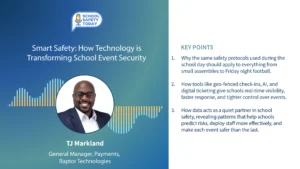The Importance of Post-COVID Student Mental Health
Yet another cataclysmic shift in education due to COVID is a new appreciation for the role of student mental health. You can’t learn if you are not well. In this episode, Duncan Young, CEO of Effective School Solutions, a leading provider of school-based mental health services, speaks to mental health’s new center stage role and how these improvised remote platforms can help (to a degree.)
The company recently released an updated version of their C.O.P.E. mental health planning framework to help districts implement mental health supports students need due to the impact that the COVID-19 pandemic has had (and continues to have) on student social-emotional health.
C.O.P.E. 2.0 incorporates over six months of national mental health data as well as the hands-on experience gleaned from ESS’ partnerships with school districts during the fall 2020 semester. The framework includes a re-thinking of the key areas of focus for districts, and a refreshed checklist of actionable items to support student and staff mental health.
“Children have lost so much to COVID, beloved family members have died, school has been disrupted, and normal and needed activities with friends have been on hold for months and months,” said Linda Rosenberg, Executive Director of External Relations, Columbia University Department of Psychiatry, and co-author of the C.O.P.E. framework. “It’s imperative that as schools re-open, attention be paid to students’ social-emotional needs and ESS’ C.O.P.E. 2.0 offers a roadmap to do just that.”
The C.O.P.E. 2.0 framework is organized around four key domains:
- Centering school re-openings around mental health services.
- Organizing support to re-acclimate to the structure of the school environment.
- Preparing schools to serve a significantly higher number of students with mental health challenges.
- Equity focused approaches to care.
Duncan Young, CEO of ESS, stated, “A growing body of research is highlighting the negative effects of the pandemic on student mental health. These challenges will be even more apparent once schools move to more regular physical schooling, and it’s vital that every district build a mental health safety net to support all students. We hope this framework assists districts with this effort.”
Please click here to read C.O.P.E. 2.0: A Blueprint for Addressing 2021’s Mental Health Challenges.
Listen to Previous Episodes of EdTech Today!
Follow us on social media for the latest updates in B2B!
Twitter – @MarketScale
Facebook – facebook.com/marketscale
LinkedIn – linkedin.com/company/marketscale







